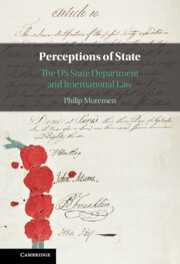Book contents
- Perceptions of State
- Perceptions of State
- Copyright page
- Contents
- Tables
- Preface and Acknowledgments
- 1 Introduction
- 2 Background Literature
- 3 State Compliance with International Law
- 4 Compliance by the United States
- 5 The Role of International Law in State Department Policymaking
- 6 The Trump Administration and International Law in the State Department
- 7 Conclusion
- Appendix Interview Subjects
- Index
3 - State Compliance with International Law
Published online by Cambridge University Press: 07 June 2024
- Perceptions of State
- Perceptions of State
- Copyright page
- Contents
- Tables
- Preface and Acknowledgments
- 1 Introduction
- 2 Background Literature
- 3 State Compliance with International Law
- 4 Compliance by the United States
- 5 The Role of International Law in State Department Policymaking
- 6 The Trump Administration and International Law in the State Department
- 7 Conclusion
- Appendix Interview Subjects
- Index
Summary
Chapter Three explores the views of former officials regarding compliance by states with international law. Almost all former officials believed that international law constrains state behavior, at least to some extent, and that states comply with international law much of the time. The top positive factors favoring compliance, as revealed by frequency counts, were reputational concerns; state interest in a stable legal and institutional system; reciprocity, or the prospect of retaliation; ethical considerations, including ethical values underlying international law rules and respect for the rule of law; idiosyncratic factors, including the history and culture of states; and benefits flowing from participation in specific regimes. The significant role of ethical factors gives a boost to normative theories about compliance. The role of systemic interests illustrates the benefits of a multilateral, institutional, and rule-based system. Among the factors militating against compliance, the dominant factor was state interest. Many former officials suggested that decisions about compliance involve a cost–benefit assessment, a consideration of many factors including international law. The chapter concludes by considering the former officials’ perceptions about the reasons that states outside of the United States take into consideration regarding compliance with international law.
Keywords
- Type
- Chapter
- Information
- Perceptions of StateThe US State Department and International Law, pp. 65 - 103Publisher: Cambridge University PressPrint publication year: 2024

